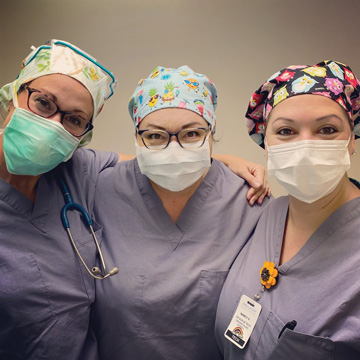ASCs owned entirely by physician groups decreased by 9% in the last five years, according to the Ambulatory Surgery Center Association (ASCA). Fifty-two percent were owned by physicians last year, compared with 61% in 2017. Physician and
corporate (ASC management companies or private-equity groups) partnerships increased by 11%, from 4% in 2017 to 15% last year, according to ASCA. Tri-party ASC ownership deals involving physicians, hospitals and corporations rose by 6%, from
1% in 2017 to 7% last year.
Acquisitions, mergers and multi-party joint ventures are taking place across the country. In December, Tenet Healthcare Corporation and its subsidiary, ASC management company United Surgical Partners International (USPI), spent $1.1 billion to
acquire SurgCenter Development’s (SCD) ownership interests in 86 ASCs they hold in joint ventures with physicians’ practices. At the time of the announcement, USPI was offering an additional $250 million to acquire some ownership
stakes of the physician groups. USPI and SCD also have plans to build at least 50 de novo ASCs.
Tenet wants to acquire 600 ASCs by the end of 2025, CEO Saum Sutaria said in a presentation at the J.P. Morgan Healthcare Conference in January. When announcing the earlier acquisition of ASCs, former Tenet CEO Ron Rittenmayer said, “This
is a transformative transaction within our stated strategy to expand our ambulatory platform. It will enhance our overall business mix and further diversify our earnings profile by accelerating our shift toward lower cost of care, consumer-friendly,
faster-growing assets for Tenet, USPI and our physician and health system partners.”
Mr. Uba doesn’t think these types of acquisitions mean the end for freestanding ASCs. He concedes they make sense for some practices around the country that might need a financial infusion and could benefit from the shared-savings programs
that large national management companies provide. Excelsior, however, is well positioned in the community, with good relationships with local commercial payers. “I believe we can negotiate better contracts than someone from the outside
could come in and do,” says Mr. Uba. “I just don’t buy that you have to add another mouth to feed in order to have the resources needed to grow and survive.”
I just don’t buy that you have to add another mouth to feed in order to have the resources needed to grow and survive.
— David Uba, MBA
The Excelsior group wants to stay independent so it can retain control of how they practice medicine and the culture of their center without outside interference. “We think it’s important for the doctors to be the ones who are rewarded
the most, because they’re the ones doing the work and their true motivation really is patient care and patient outcomes,” says Mr. Uba. “Primary profit motives in health care aren’t good for patients and aren’t
best for communities.”
Staying independent is also important for ASCs when it comes to sustainability and succession planning, according to Mr. Uba. Excelsior couldn’t get new surgeons to buy stakes of retiring physicians if 51% of the facility’s ownership
had been sold to a second party. “That’s counter to the entrepreneurial spirit that drew physicians to develop freestanding ASCs in the first place,” he says.
The consulting service Excelsior is planning to start would be more of a professional collaborative than a management company. Mr. Uba envisions cardiac, urology or GI practices in Western New York coming to the group and asking for help in modeling
Excelsior’s success in orthopedics.
“We think we’ll be able to help those practices recruit physicians to the area and help them set up their back-office and administrative functions without needing to partner with an outside entity that will want an ownership stake
in their business,” he says. “We’d like to help them build cohesive practice models that include a surgery center and all the ancillary services they require.”
The biggest current trend is private
equity physician practice management firms buying stakes in ASCs that are already in joint ventures with hospitals or ASC management companies, according to Jerry J. Sokol, a partner at McDermott, Will & Emery and the global head of the
law firm’s healthcare division in Miami. When a third party is added to this type of deal, the management company typically keeps their percentage stake, generally 51%, and the physician practice relinquishes a portion of its ownership.
Mr. Sokol says physician-owned ASCs selling to an ASC management company, which has gone on for years, often makes sense. Small independent ASCs might be better off being part of a larger group that can negotiate better managed-care contracts
and get better deals on ancillary services such as MRIs, physical therapy and lab work.
Hospitals want a larger stake in ASCs because they’re witnessing private surgical practices take some of their most profitable procedures from HOPDs, says Mr. Sokol. “Aligning themselves with these physicians and entering into joint
ventures with them is the hospital’s way of conceding that 50% of something is better than 100% of nothing,” he adds.
While private equity firms are rolling up many physician practices into larger groups, the majority of surgical practices remain independent, so the acquisitions will continue, says Mr. Sokol. But he doesn’t see the continuing trend as the
demise of independent ASCs. In fact, he thinks buying into an ASC that hasn’t been sold to a partner is at least as appealing to a young doctor — even if they’re saddled with a mountain of debt from medical school —
than taking an attractive salary offer from a hospital. And it’s certainly a better prospect than joining a practice that is already in a joint venture.
“Physicians who sell to partners essentially sell their future,” says Mr. Sokol. “A young doctor doesn’t want to join a practice that has sold a significant percentage of its profits that are now going to private equity
firms, which give part of that as a return to their investors.”
Mr. Sokol says independent ASCs will always exist and continue to proliferate. “It’s just a matter of who will own them,” he adds.
.svg?sfvrsn=be606e78_3)


.svg?sfvrsn=56b2f850_5)